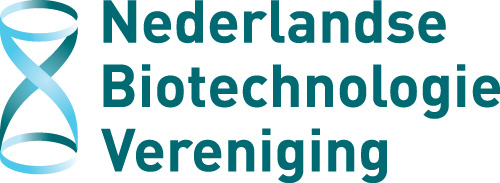On Tuesday the 16th of May 2017 the 17th edition of the Netherlands Biotechnology Conference (NBC-17) was organised by the Dutch Biotechnology Association (NBV). During this day, 135 professionals and students working in the biotechnology workfield were connected to each other and informed during several interactive sessions and keynotes about the latest developments in their workfield.
Next Level Keynotes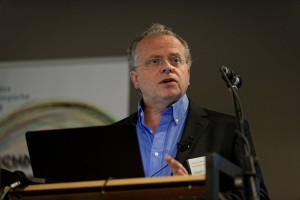 Luuk van der Wielen, among others professor at Delft University of Technology and University of Limerick, was the first keynote speaker. The title of his presentation was ‘Towards a biobased economy’. He showed the audience how global drivers turn into local opportunities. Global drivers, such as global warming, create a demand of solutions. “If you compare the body temperature to the temperature of the Earth, then an increase of two degrees is a fever and an increase of four degrees is a coma.” Due to the global drivers, the demand for adequate solutions is high. The development of these solutions, however, takes time. Biobased replacement solutions can only be successful if they approach the economic benefits of their predecessors. “There is no alternative, therefore investments are needed to counter the high rate of change. The government should take lead in this change.”
Luuk van der Wielen, among others professor at Delft University of Technology and University of Limerick, was the first keynote speaker. The title of his presentation was ‘Towards a biobased economy’. He showed the audience how global drivers turn into local opportunities. Global drivers, such as global warming, create a demand of solutions. “If you compare the body temperature to the temperature of the Earth, then an increase of two degrees is a fever and an increase of four degrees is a coma.” Due to the global drivers, the demand for adequate solutions is high. The development of these solutions, however, takes time. Biobased replacement solutions can only be successful if they approach the economic benefits of their predecessors. “There is no alternative, therefore investments are needed to counter the high rate of change. The government should take lead in this change.”
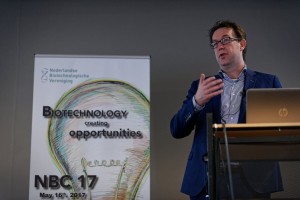 The second keynote speaker was Rob Vries, managing director of Hubrecht Organoid Technology. His company is a spin-off non-profit company that was set up together with Clevers and Logtenberg. They work with adult stem cells and turn them into tiny organs, called organoids. After they were able to find which cells in an organ are the adult stem cells, there were suddenly lots of possibilities. In comparison to embryonal stem cells, adult stem cells are already programmed to the creation of a certain organ. Adult stem cells grow in vitro into miniature organs, that represent the actual patient. They are now creating a biobank, by expanding the organoids, which ultimately could lead to personalized treatment, drug screening and many other possibilities.
The second keynote speaker was Rob Vries, managing director of Hubrecht Organoid Technology. His company is a spin-off non-profit company that was set up together with Clevers and Logtenberg. They work with adult stem cells and turn them into tiny organs, called organoids. After they were able to find which cells in an organ are the adult stem cells, there were suddenly lots of possibilities. In comparison to embryonal stem cells, adult stem cells are already programmed to the creation of a certain organ. Adult stem cells grow in vitro into miniature organs, that represent the actual patient. They are now creating a biobank, by expanding the organoids, which ultimately could lead to personalized treatment, drug screening and many other possibilities.
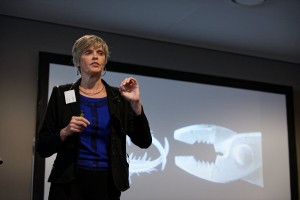 The last plenary session started more interactive. Ylva Poelman, director of the Bionica Innovation and Expertise Center and partner in the project 'Bionica for SMEs', kicked off with a little quiz. The audience had to guess which tool was represented by a photo of something natural. This is the foundation of bionica: “Bionica is an innovation method that uses 4 billion years of experience from nature as an inspiration for out-of-the-box sustainable (breakthrough) innovations.” With several examples she showed how bionica can influence biotechnology. Some of these examples were the fin ray effect and the bombardier beetle.
The last plenary session started more interactive. Ylva Poelman, director of the Bionica Innovation and Expertise Center and partner in the project 'Bionica for SMEs', kicked off with a little quiz. The audience had to guess which tool was represented by a photo of something natural. This is the foundation of bionica: “Bionica is an innovation method that uses 4 billion years of experience from nature as an inspiration for out-of-the-box sustainable (breakthrough) innovations.” With several examples she showed how bionica can influence biotechnology. Some of these examples were the fin ray effect and the bombardier beetle.
Parallel sessions & Posters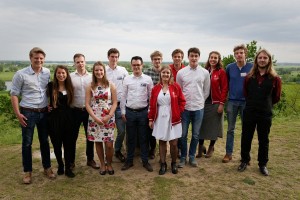 The NBV work groups hosted the several parallel sessions. These work groups are Cell and Fermentation Technology, Microbial Systems Biology & Synthetic Biology, Green Biotechnology, Young NBV, Product Isolation, Applied Biocatalysis, Microbial Physiology and Societal Aspects of Biotechnology.
The NBV work groups hosted the several parallel sessions. These work groups are Cell and Fermentation Technology, Microbial Systems Biology & Synthetic Biology, Green Biotechnology, Young NBV, Product Isolation, Applied Biocatalysis, Microbial Physiology and Societal Aspects of Biotechnology.
Moreover, visitors could visit several posters and companies during the breaks. Among these posters, were the Dutch iGem contestants. Are you curious about the posters or parallel sessions? Please check-out the NBC-17 App for all abstracts!
The successful and exciting day was closed with a reception and a dinner.
Half of the NBV board changed during ALV
In the general member assembly (ALV), half of the NBV board was replaced. Sandra de Weert (Koppert B.V.) was replaced by Eric de Zilver (Koppert B.V.), Freek Appels (Utrecht University) replaced Pauline Krijgsheld (Utrecht University), Richèle Wind (HAN BioCentre) was replaced by Ruud Heshof (HAN BioCentre) and Richard van Kranenburg (Corbion) replaced Emile van de Sandt (DSM Sinochem Pharmaceuticals). Richard is the new vice-president and Aldrik Velders is the new president of the NBV. The board thanked Emile, Richèle, Sandra and Pauline for their contributions to the NBV.
